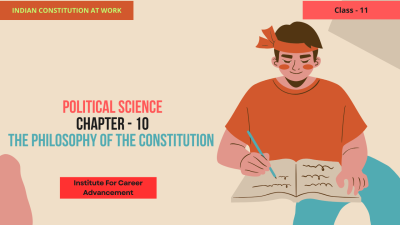The Philosophy of the Constitution - Class 11

₹299
The Philosophy of the Constitution refers to the underlying principles and values that shape the document and its interpretation. It encompasses the ideas and beliefs that guide the framers of the constitution and influence how it is understood and applied. Key philosophical principles often found in constitutions: Rule of law: The principle that everyone is subject to the law, regardless of their position or status. Equality: The principle that all individuals are equal before the law and have equal rights and opportunities. Liberty: The principle that individuals have the freedom to make their own choices and pursue their own interests, subject to certain limitations. Justice: The principle that all individuals are treated fairly and impartially. Democracy: The principle that the government is chosen by the people and is accountable to them. Secularism: The principle that the state is neutral on matters of religion. Social justice: The principle that all individuals have a right to a fair and equitable share of society's resources. Federalism: The principle that power is divided between a central government and regional governments. How these principles are reflected in the Indian Constitution: Rule of law: The Constitution guarantees that everyone is equal before the law and that no one is above the law. Equality: The Constitution prohibits discrimination on the basis of religion, caste, sex, or place of birth. Liberty: The Constitution guarantees fundamental rights such as freedom of speech, expression, and assembly. Justice: The Constitution establishes an independent judiciary to ensure that justice is delivered impartially. Democracy: The Constitution establishes a representative democracy, where the government is chosen by the people through elections. Secularism: The Constitution declares India to be a secular state, ensuring that the state is neutral on matters of religion. Social justice: The Constitution includes provisions to promote social justice, such as affirmative action for marginalized groups. Federalism: The Constitution establishes a federal system of government, dividing power between the central government and the states. Understanding the philosophy of the constitution is essential for: Interpreting the constitution: The philosophy of the constitution provides a framework for understanding its meaning and purpose. Analyzing constitutional issues: The philosophy of the constitution can be used to analyze and resolve constitutional disputes. Promoting democratic values: The philosophy of the constitution upholds democratic values such as rule of law, equality, and liberty. Strengthening the constitution: Understanding the philosophy of the constitution can help to strengthen and protect it from erosion. সংবিধানের দর্শন সেই অন্তর্নিহিত নীতি ও মূল্যবোধকে বোঝায় যা নথি এবং এর ব্যাখ্যাকে রূপ দেয়। এটি সেই ধারণাগুলি এবং বিশ্বাসগুলিকে অন্তর্ভুক্ত করে যা সংবিধানের নির্মাতাদের পরিচালনা করে এবং কীভাবে এটি বোঝা ও প্রয়োগ করা হয় তা প্রভাবিত করে। মূল দার্শনিক নীতিগুলি প্রায়শই সংবিধানে পাওয়া যায়ঃ আইনের শাসনঃ এই নীতি যে প্রত্যেকে তাদের অবস্থান বা মর্যাদা নির্বিশেষে আইনের অধীন। সমতাঃ এই নীতি যে সকল ব্যক্তি আইনের দৃষ্টিতে সমান এবং তাদের সমান অধিকার ও সুযোগ রয়েছে। স্বাধীনতাঃ এই নীতি যে ব্যক্তিরা নির্দিষ্ট সীমাবদ্ধতা সাপেক্ষে তাদের নিজস্ব পছন্দ বেছে নেওয়ার এবং তাদের নিজস্ব স্বার্থ অনুসরণ করার স্বাধীনতা রাখে। ন্যায়বিচারঃ এই নীতি যে সমস্ত ব্যক্তির সাথে ন্যায্য ও নিরপেক্ষ আচরণ করা হয়। গণতন্ত্রঃ এই নীতি যে সরকার জনগণের দ্বারা নির্বাচিত হয় এবং তাদের কাছে দায়বদ্ধ। ধর্মনিরপেক্ষতাঃ ধর্মের বিষয়ে রাষ্ট্রের নিরপেক্ষতার নীতি। সামাজিক ন্যায়বিচারঃ এই নীতি যে সমাজের সম্পদের ন্যায্য ও ন্যায়সঙ্গত অংশীদারিত্বের অধিকার সকল ব্যক্তির রয়েছে। ফেডারেলিজমঃ কেন্দ্রীয় সরকার এবং আঞ্চলিক সরকারের মধ্যে ক্ষমতা ভাগ করার নীতি। ভারতীয় সংবিধানে এই নীতিগুলি কীভাবে প্রতিফলিত হয়েছেঃ আইনের শাসনঃ সংবিধান এই নিশ্চয়তা দেয় যে, আইনের সামনে সবাই সমান এবং কেউই আইনের ঊর্ধ্বে নয়। সমতাঃ সংবিধান ধর্ম, বর্ণ, লিঙ্গ বা জন্মস্থানের ভিত্তিতে বৈষম্য নিষিদ্ধ করে। স্বাধীনতাঃ সংবিধান বাকস্বাধীনতা, মতপ্রকাশ এবং সমাবেশের মতো মৌলিক অধিকারের নিশ্চয়তা দেয়। ন্যায়বিচারঃ সংবিধান নিরপেক্ষভাবে ন্যায়বিচার নিশ্চিত করার জন্য একটি স্বাধীন বিচার বিভাগ প্রতিষ্ঠা করে। গণতন্ত্রঃ সংবিধান একটি প্রতিনিধিত্বমূলক গণতন্ত্র প্রতিষ্ঠা করে, যেখানে সরকার নির্বাচনের মাধ্যমে জনগণের দ্বারা নির্বাচিত হয়। ধর্মনিরপেক্ষতাঃ সংবিধান ভারতকে একটি ধর্মনিরপেক্ষ রাষ্ট্র হিসাবে ঘোষণা করে, যা নিশ্চিত করে যে রাষ্ট্র ধর্মের বিষয়ে নিরপেক্ষ। সামাজিক ন্যায়বিচারঃ সংবিধানে সামাজিক ন্যায়বিচারের প্রচারের বিধান রয়েছে, যেমন প্রান্তিক গোষ্ঠীগুলির জন্য ইতিবাচক পদক্ষেপ। যুক্তরাষ্ট্রীয়তাঃ সংবিধান কেন্দ্রীয় সরকার এবং রাজ্যগুলির মধ্যে ক্ষমতা ভাগ করে একটি যুক্তরাষ্ট্রীয় সরকার ব্যবস্থা প্রতিষ্ঠা করে। সংবিধানের দর্শন বোঝার জন্য অপরিহার্যঃ সংবিধানের ব্যাখ্যাঃ সংবিধানের দর্শন এর অর্থ ও উদ্দেশ্য বোঝার জন্য একটি কাঠামো প্রদান করে। সাংবিধানিক বিষয় বিশ্লেষণঃ সাংবিধানিক বিরোধ বিশ্লেষণ ও সমাধানের জন্য সংবিধানের দর্শন ব্যবহার করা যেতে পারে। গণতান্ত্রিক মূল্যবোধের প্রচারঃ সংবিধানের দর্শন আইনের শাসন, সমতা এবং স্বাধীনতার মতো গণতান্ত্রিক মূল্যবোধকে সমর্থন করে। সংবিধানকে শক্তিশালী করাঃ সংবিধানের দর্শনকে বোঝা এটিকে শক্তিশালী করতে এবং ক্ষয় থেকে রক্ষা করতে সহায়তা করতে পারে।
Learn more
 0
0 